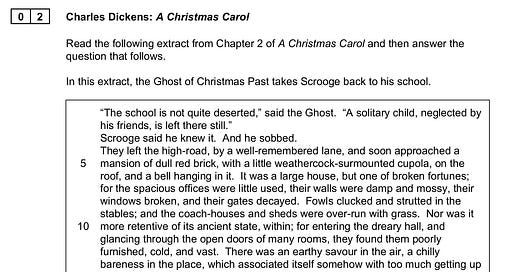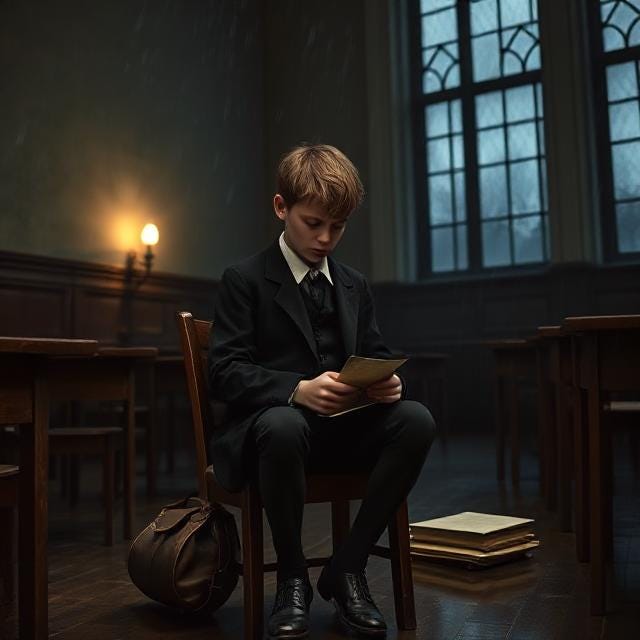A Christmas Carol grade 7 essay marked with feedback 📝
How does Dickens present the effects of isolation and loneliness?
This week I’m sharing a grade 7 GCSE student essay which I’ve marked, along with my feedback to show you how this essay could be revised to score an 8 or a 9.
To get the most out of this newsletter, I would recommend you read the student essay with my comments, mark it yourself using the poll below and then read my summary.
Extract and the question
Student essay with my comments (italicised)
Dickens presents the effects of loneliness and isolation through the character of Scrooge. Dickens highlights to his readership how the malthusian views that were adopted from wealthy merchants like Scrooge during the Victorian Era culminated in their lack of happiness and warmth. By effectively crafting Scrooge as a miserly character that maintains his obdurate nature and failure to recognise the value of the proletariat to society, he demonstrates that even the most cold-hearted aspect of society can change their ways by being much more generous towards the poor.
In your opening sentence, you basically paraphrase the question; give a more specific opinion. You then provide contextual framing which is essential to secure a top grade but your context should support an argument which responds to the question. There is a general lack of clarity in the final sentence and it’s not clear how this opinion relates to both loneliness and isolation.
The essay question invites you to consider how Scrooge’s own loneliness and isolations have shaped his character. You need to turn to the early scenes, the visions which The Ghost of Christmas Past shows Scrooge, to really understand how Scrooge’s lonely and isolated childhood turns him into the miserly character that we see at the beginning of the novella.
At the start of the novella, Dickens presents Scrooge as a pantomime villain. He introduces the idea that social injustice is synonymous with avariciousness towards the poor. As a result, Scrooge is ostracised from society as he is described as a misanthropic character that is heavily disliked by people around him. This parsimonious aspect of him is shown when he is described as “a squeezing, wrenching, grasping, scraping, clutching, covetous old sinner” showing how he is emblematic of someone who follows the seven deadly sins. Dickens lays on the harsh consonance of ‘t’ and ‘c’ and ‘k’ to emphasise the harshness of his personality. Additionally, the extravagant sibilance in “secret , and self-contained, and solitary as an oyster” is used to refer to the generosity of Dickens language techniques which mimics Dickens desire to make us more generous with our thoughts and intentions towards the poor. Therefore, Dickens uses the character of Scrooge to warn his readership about the catastrophic consequences of being isolated from society and how it results in this degradation of compassion and generosity which we once possessed.
I like the comment on consonance in this paragraph. That’s a thoughtful comment on the language. This paragraph in general, however, lacks clarity. There are a lot of ambitious word choices which don’t make sense. For example, ‘avariciousness towards the poor’ means extreme greed towards the poor which means what? Focus on putting things as simply as you can rather than showing off your vocabulary, otherwise you’ll end up saying things which don’t make sense. Additionally, scrutinise your own analysis. The words quoted really only emphasise one deadly sin, which is greed, and you don’t follow the seven deadly sins, do you?
One thing that you really want to say here is that Scrooge chooses to isolate himself. You suggest that Scrooge is isolated by everyone around him, but Dickens suggests that Scrooge pushes everyone away and stays emotionally distant. Remember, even the blind man’s dog turns away from Scrooge as if to say ‘No eye at all is better than an evil one, dark master!’
Within the extract, Dickens presents the effects of loneliness and isolation through Scrooge’s younger self. The Ghost of Christmas Past takes Scrooge back to when he was a child to highlight how his neglect from his family resulted in his present day miserly and misanthropic nature. Dickens employs symbolism at the start of the extract to show how the “decayed gates” and “spacious offices” reflect the internal feeling within the scrooge. Alternatively, the “decayed gates” could demonstrate how scrooge will be internally ‘decayed’ and will be rusted with misanthropy and avariciousness. Therefore, the setting that Dickens uses to describe Scrooge’s school foreshadows his later attitude towards the poor during a time like Christmas. Perhaps this resonates within Dickens himself and the idea that Dickens had to briefly work in a factory when he was just 12 years old after his father was sent to debtor’s prison. This highlights how children of that time were treated unfairly and were exploited for labour. Therefore, when Scrooge ‘wept to see his poor forgotten self’, it underscores the feeling of sympathy from the reader as we gain an insight into Scrooge’s abandonment from everyone around him when he was younger.
At first, it’s encouraging to see you consider Scrooge’s childhood and his formative experiences, but you don’t explain how the neglect led to him becoming miserly. Then you choose to dive into the symbolism of the ‘gates’ and ‘spacious offices’... and these comments are not convincing. You bring in some relevant contextual information but it doesn’t clearly support your thesis or the specific argument you’re making here in this paragraph. Again there’s a general lack of clarity. How is one ‘rusted’ with misanthropy and avariciousness?
Elsewhere in the novella, Dickens presents the effects of loneliness and isolation in Stave 4 through the Ghost Of Christmas Yet To Come. The spirit is ‘shrouded in a deep black garment’ which suggests how he is the archetype of a typical ghost during the Victorian Era helping Scrooge unleash his moral reckoning and allowing him to be a redemptive character. When Scrooge tells him “ I fear you more than any spectre I have seen!” It is evident that Scrooge has succumbed to his cold-hearted and villainous nature which he sustained throughout his life and vows to change his ways for the better. The exclamatory sentence reveals his recognition of the gravity of this situation and the result of his unscrupulous and covetous life choices.
Again, consider using simpler vocabulary. In the second sentence, for example, you could say, The ghost is ‘shrouded in a deep black garment’, appearing as an ominous Grim Reaper figure, and its foreboding presence along with it visions help to terrify Scrooge into action. You could then continue or end with a comment about the final stave being the start of Scrooge’s redemption.
Of course, you should aim to write in an academic register, employing more sophisticated sentence structures and utilising relevant subject terminology. However, in an exam, err on the side of caution: keep to words you know and favour the active over the passive voice to express your thoughts.
Now review the mark scheme and consider how you would score this essay
Summary/ overall feedback
You do well to cover the whole text, but it’s a little short. Most significantly, you need to consider how Scooge’s formative childhood years affect him. This is key not just for answering this question, but any question you might have on A Christmas Carol. It helps to understand why Scrooge is the way he is and what motivates him to redeem himself. Dickens actually wants us to feel sympathy for Scrooge, even though he is such a callous, miserly character!
Mark: L5 (roughly corresponds to a grade 7 or 8 depending on whether it’s low or high in the level)
Were we in agreement? If not and you have any questions, please feel free to post them in the comments on my Substack.
Thanks for reading. I hope this newsletter helps you to understand how to write a top level English Literature essay.
Best wishes,
Morgan






